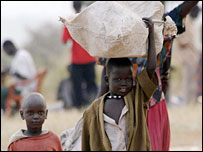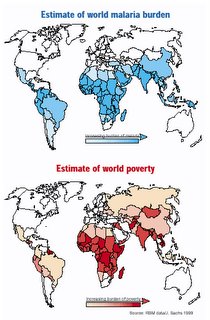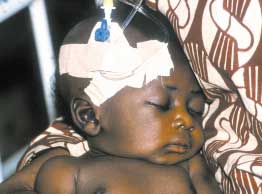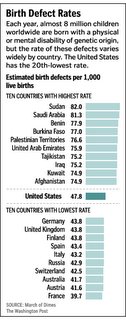2/28/06
Venture Capitalists Invest in Educational Reform
"We give education entrepreneurs money to start or to speed up building their companies," said L. John Doerr, who over 26 years has helped start dozens of ventures, including Sun Microsystems, Amazon.com and Google.
Unlike the usual venture capital firm, this [new school] venture does not earn the standard three to five times its investment in five years. It earns nothing, because it is "a philanthropy held accountable by the rigors of venture capital financing," as Mr. Doerr describes it.
The financial professionals of the fund oversee the business operations of the schools it backs. The operations are expected to quickly become self-sustaining on the stipends paid from local, state and federal taxes for educating each student.
Recipients of the fund's investments are not whiz kids eager to become the next Bill Gates. Mainly, they are public school teachers with a passion to improve the ways poor children are taught. The companies they form are nonprofit charter school management organizations, capable of running publicly financed elementary and secondary schools producing educational results better than those of the large urban school district. Almost all their students are eligible for free or reduced-price breakfasts and lunches.
[Excerpt from an article by James Flanigan, The New York Times]
2/27/06
Military Industrial Complex
45 years ago, departing President Dwight Eisenhower gave us our answer. It was in his 1961 farewell address to the American people that Eisenhower coined the phrase "military-industrial complex," an unholy alliance between the Pentagon and its contractors that he saw gaining "unwarranted influence" over public policy. Today, in more ways than we know, these words haunt us.
As the 5-star General became President, he would learn firsthand that the power of this alliance was growing out of control, tightening its grip on even his own decision-making as President. "God help this country," a weary Eisenhower was overheard to say in the Oval Office, "when someone sits at this desk who doesn't know as much about the military as I do."
And we are left wondering how September 11 led to a war whose estimated cost may now exceed $2 trillion.
[Excerpt from Eugene Jarecki, writing on HuffingtonPost.com]
2/26/06
Record deficit spending by the 'party of small government'
Probably not - unless, that is, you were a member of Congress running for re-election this year and you get to spend other people's money.
Add 8 zeros to the numbers in the example above, and you'll get an idea of the spending by Congress, who is spending other people’s money - our money.
 The federal budget deficit will be in the range of $400 billion this year. That means roughly $1 in every $6 spent by the government will be borrowed money.
The federal budget deficit will be in the range of $400 billion this year. That means roughly $1 in every $6 spent by the government will be borrowed money.[Source of financial figures: Washington Post]
2/25/06
Big spending by the 'party of small government'
Meanwhile, the cost of servicing the debt rises, squandering $250 billion a year.
The Bush administration began their first term with a surplus left by the Clinton administration, but pretty much right away got us involved with wars in Afghanistan and Iraq, after which Hurricane Katrina hit.
Republicans controlling both Congress and the White House have spent more than double the rate in the last five years of Clinton-era budgets and we are left with a record deficit.
[Source of financial figures Washington Post]
2/24/06
Federal government spends $78,418 per second
This means that, on average, the federal government spent nearly $6.8 billion each day, or approximately $78,418 per second.
On the sidebar of this site is a counter showing how much is being spent on the Iraqi War every second.
The Census Bureau estimates that in 2004 (the latest year for which data are available) median household income in the U.S. was $44,389.
With Bush administration spending $78,418 per second, this means that the federal government spends almost twice as much money in only one second as a typical American household earns in an entire year.
[Financial figures thanks to Bill Bonner, The Daily Reckoning]
2/23/06
Bush Calls For Muscle In Darfur
Bush brushed aside the resistance of some senior policymakers and sided with White House adviser Michael J. Gerson and others who have been lobbying for more assistance to Darfur.
But many details of the policy shift need to be worked out, including how many U.S. troops would be part of the beefed-up international peacekeeping effort.
Bush this week also proposed $500 million for Darfur as part of a larger special budget request to Congress.
[From an article by Jim VandeHei and Colum Lynch, Washington Post]
From Bosnia to Darfur
The Darfur region of Sudan is often described as the worst place on earth. Ethnic cleansing continues there, nearly three years after it first shocked the world. As many as 300,000 people are dead, and an estimated 2.4 million have been displaced.
The past few days have brought renewed attention to Darfur's despair. U.S. speedskater Joey Cheek donated his $40,000 in Olympic medal bonuses to a Sudanese relief effort. More significantly, President Bush outlined a fresh effort to end the killings with up to 20,000 United Nations troops and, possibly, a serious NATO role.
Bush's push is a step in the right direction but one that stops short of a solution. For that, the world needs to understand - and apply - the lessons of how Bosnia's murderous tribalism was tamed a decade ago. The Bosnia war ended when leaders of the warring factions were brought to an air base in Dayton, Ohio, and forced into an agreement. U.S.-led NATO forces then moved in.
A similar need exists in Darfur for a hard-charging, U.S.-led effort to bang together the heads of Sudan's leaders - because they are enabling the ethnic cleansing.
[From Opinion page USAToday]
2/22/06
More reaction to gorilla killings than human
- Statement by Lieutenant General Romeo Dallaire, head of UN peacekeeping force, made in Rwanda at the time of the 1994 genocide
2/21/06
Darfur, World's worst humanitarian crisis
The historic conflict between Arabs and Africans is a recurring theme in Sudan, but it would be wrong to assume that it is always Arabs who are the victors, and Africans the vanquished.
 In camps for internally displaced people (IDP) in Darfur, where the United Nations' World Food Program (WFP) works, there are many examples of families and communities whose stories do not fit into simple stereotypes.
In camps for internally displaced people (IDP) in Darfur, where the United Nations' World Food Program (WFP) works, there are many examples of families and communities whose stories do not fit into simple stereotypes.While the majority of the displaced are black Africans who have fled attacks by the Arab Janjaweed militia, there are also displaced Arab communities, whose villages were attacked by African groups, and who are victims of inter-African ethnic fighting. There are even parts of South Darfur where the WFP currently cannot work because of a dangerous traditional conflict between rival Arab groups.
The latest conflict began in early 2003, when two Darfur rebel groups took up arms against the Arab-led Islamic government in Khartoum, citing discrimination against the region's black tribes. The Sudanese government armed and organized a local Arab militia, known as the Janjaweed, to target local communities that were suspected of sympathizing with the rebels.
U.N. officials say as many as 200,000 people may have been killed by violence and disease as a result of the attacks.
2/20/06
Mr. Bush and Darfur Genocide
 Having passed through three stages of denial on the Darfur issue, it appears that the Bush administration may finally be accepting United Nations Secretary General Annan's appeal for a more serious peacekeeping deployment.
Having passed through three stages of denial on the Darfur issue, it appears that the Bush administration may finally be accepting United Nations Secretary General Annan's appeal for a more serious peacekeeping deployment.For the last couple years, the Bush administration and its allies have clung to the fiction that they could stop the genocide in the Sudanese territory of Darfur by just sending in African Union forces.
Kofi Annan spoke the truth about these troops: "They didn't have the large numbers that would have been required for a region the size of Darfur. They didn't have logistical support."
This shouldn't even be a question. In 2004 Mr. Bush's administration sent expert investigators to interview 1,136 victims of Darfur's violence; based on this careful assessment, the administration accused Sudan's government of genocide -- the first time a government has leveled such an accusation at a sitting counterpart since the U.N. Convention on the Prevention and Punishment of Genocide was adopted in 1948.
This sickening violence was genocide when it began in 2003, and it remains so three years later. The excuses for not confronting it with a serious Western troop deployment never looked good, but they are now thinner than ever.
Darfur's violence has recently grown worse and has spread into neighboring Chad, a country that plays host to French troops and American oilmen and seems on the verge of a civil war fomented by rebels apparently linked to Sudan's military.
[Source: Washington Post Editorial]
related post
2/19/06
Charity a new concept in China
"Charity in China has much room for improvement and the government should reduce tax on donations to encourage more giving from companies," said Tian Di, director of the managing committee of the Foundation's minors' ideological and moral education branch.
No more than 100,000 Chinese companies, a mere one percent of the country's 10 million registered firms, have had a history in making donations to charity, according to the National Development and Reform Commission.
"China needs to create a credible, transparent and self-disciplined charity system with independent third-party evaluation which receives supervision from government, media and all of society," the newspaper quoted Tian as saying. "People can be confident about where their donation goes if the charity organization has a high credibility."
It is estimated that by the end of 2004, about 5 billion yuan (617 million U.S. dollars) had been donated to China's charitable organizations, accounting for 0.05 percent of the gross domestic product. In comparison, it was 2.17 percent in the United States
[Source: Xinhuanet]
2/18/06
Scots top charity givers in the UK
It seems Scots are more likely than the rest of the UK to give to charity, with one in three prepared to donate, compared with one in four south of the border. Oxfam say its due to events such as the tsunami and the Asian earthquake.
News coverage of disasters and the aftermath hit a worldwide audience and it seems Scots were particularly affected.
Judith Robertson from Oxfam Scotland said "I think the events of 2005 have mobilized people. The make poverty history march in Edinburgh, the fact that G8 was in Scotland and 250 000 people marched there. People were energized and encouraged to do more and I think particularly in Scotland."
The research also shows that women are more generous than men with one in four donating money each month compared with one in five men.
Oxfam say while it's always important that people put their money where their mouth is, it is also crucial that they do not just give their cash but consider donating their time as well perhaps as a volunteer.
Source: Scotland Today
2/17/06
Aussie Charity
Western Pacific financial adviser Ivan Ang believes many people want to do more with their wealth to make a difference to society. He points to a trend among clients already giving to charity who reach a point where they want to move beyond cheque-book philanthropy to a more strategic giving plan.
A report released by the Prime Minister's Community Business Partnership committee recently estimated that Australian individuals and businesses gave $11 billion to charity in 2004. Yet the amount we give as a proportion of GDP is just 0.5 per cent, well behind the US at 2.1 per cent and trailing Britain at 0.77 per cent.
The Federal Government has given philanthropy a boost with the introduction of tax-effective vehicles for giving, notably prescribed private funds, introduced in 1999. There are more than 350 such funds, with a combined kitty of more than $400 million.
[Excerpt of an article by Barbara Drury, The Sydney Morning Herald]
2/16/06
Aid to Afghanistan 4 Years Later
The principal dilemma is the narcotics production and marketing, with as much as 90 percent of the world's heroin and opium again coming from Afghanistan. The Taliban government had pretty much wiped the drug trade out prior to 2001 but it's now back in full production.
The second major problem, also examined at the conference, is the lack of control that the central government of President Hamid Karzai has over Afghanistan, a country the size of Texas, which retards the development of national unity.
As to economic aid, which is critical to enhancing the credibility of the Karzai government, the United States will provide $1.1 billion in 2006 and seek the same amount from Congress for 2007. It has also found its promises of economic reconstruction aid hard to keep, given the difficult security climate there.
The United States plans to draw down its military presence in Afghanistan from about 19,000, currently costing about $800 million a month.
So it costs close to billion a month to keep U.S. troops in Afghanistan, or $9.6 Billion a year.
And meanwhile the U.S. gives the country a billion a year in aid, which is just over 11% of the amount spent on military operations.
Source: Pittsburgh Post-Gazette
2/15/06
Cheney's quail-hunting accident
If you were a comedy writer, you saw definitive proof of the existence of God.
 If you hold the Bush Administration in minimum high regard, you saw enough metaphors to power a Ph.D. thesis: a reckless, inept use of force directed at the wrong target, compounded by a cover-up.
If you hold the Bush Administration in minimum high regard, you saw enough metaphors to power a Ph.D. thesis: a reckless, inept use of force directed at the wrong target, compounded by a cover-up.There are plenty of grounds on which to make out a case against the vice president's performance in office; there are plenty of examples where his easy assurances -- about weapons of mass destruction, about the way the U.S. would be greeted in Iraq -- have turned out to be dramatically wrong-headed. But I'd prefer to see those arguments stand or fall on their merits.
As for the comedy writers, they're exempt from any analysis, rigorous or otherwise. Some temptations are, literally, irresistible.
[Excerpt of CNN story by Jeff Greenfield, CNN Senior Analyst]
Sample Cheney Jokes
· "Good news, ladies and gentlemen, we have finally located weapons of mass destruction: It's Dick Cheney."
· "We can't get Bin Laden, but we nailed a 78-year-old attorney."
· "But here is the sad part -- before the trip Donald Rumsfeld had denied the guy's request for body armor." --"Late Show with David Letterman," CBS
 · "I think Cheney is starting to lose it. After he shot the guy he screamed, 'Anyone else want to call domestic wire tapping illegal?' " "The Tonight Show with Jay Leno," NBC
· "I think Cheney is starting to lose it. After he shot the guy he screamed, 'Anyone else want to call domestic wire tapping illegal?' " "The Tonight Show with Jay Leno," NBC· "Now, this story certainly has its humorous aspects. ... But it also raises a serious issue, one which I feel very strongly about. ... Moms, dads, if you're watching right now, I can't emphasize this enough: Do not let your kids go on hunting trips with the vice president. I don't care what kind of lucrative contracts they're trying to land, or energy regulations they're trying to get lifted -- it's just not worth it." --"The Daily Show with Jon Stewart," Comedy Central
· "The big scandal apparently is that they didn't release the news for 18 hours. …Apparently the reason they didn't release the information right away is they said we had to get the facts right. That's never stopped them in the past." --"Late Late Show with Craig Ferguson," CBS
2/14/06
Iraqi War Bush budget buster
• The $2.77 trillion budget for the fiscal year starting in October breaks down to an average of $9,293.62 for everyone in the USA.
• The latest budget request for Iraq of about $96 billion brings the cost of that war to $322 billion, an average of $1,080.34 per person.
If you think big business or somebody else will pay the bill, think again. About 45% of the federal government's revenue comes from individual income taxes.
Paying more for education, health care, Social Security, real "homeland security" and … decent pay for servicemen and women doesn't bother me. But Bush simply can't convince me on continuing the cost in Iraq - in dollars and, more important, in precious lives -for a war that he never should have started.
[From editorial by Al Neuharth, founder of USA Today]
2/13/06
Food as a Commodity
To understand why people go hungry you must stop thinking about food as something farmers grow for others to eat, and begin thinking about it as something companies produce for other people to buy.
Much of the best agricultural land in the world is used to grow commodities such as cotton, sisal, tea, tobacco, sugar cane, and cocoa, items which are non-food products or are marginally nutritious, but for which there is a large market.
Millions of acres of potentially productive farmland is used to pasture cattle, an extremely inefficient use of land, water and energy, but one for which there is a market …in wealthy countries.
More than half the grain grown in the United States (requiring half the water used in the U.S.) is fed to livestock, grain that would feed far more people than would the livestock to which it is fed.
The problem, of course, is that people who don’t have enough money to buy food -- and more than one billion people earn less than $1 a day -- simply don’t count in the food equation.
What this means is that ending hunger requires doing away with poverty, or, at the very least, ensuring that people have enough money or the means to acquire it, to buy, and hence create a market demand for food.
— Richard H. Robbins, Readings on Poverty, Hunger, and Economic Development
2/12/06
Some Aid doesn’t aid at all
Many in the First World imagine the amount of money spent on aid to developing countries is massive. In fact, it amounts to only .03% of the GNP of the industrialized nations.
Additionally, For every dollar the United States puts into the World Bank, an estimated $2 actually goes into the US economy in goods and services.
Meanwhile, severely indebted low-income countries pay one billion dollars more in debt and interest to the International Monetary Fund (IMF) than they receive from it.
For the 46 countries of Sub-Saharan Africa, foreign debt service was four times their combined governmental health and education budgets.
So, we find that some aid does not aid.
- Jean-Bertrand Aristide, Eyes of the Heart; Seeking a Path for the Poor in the Age of Globalization
2/11/06
Blaming the Victim
Following are some common “myths” often used to highlight such aspects, including (and quoting):
1. Africa has received increasing amounts of aid over the years
— IN FACT, aid to Sub-Saharan Africa fell by 48% over the 1990s
2. Africa needs to integrate more into the global economy
— IN FACT, trade accounts for larger proportion of Africa’s income than of the G8
3. Economic reform will generate new foreign investment
— IN FACT, investment to Africa has fallen since they opened up their economies
4. Bad governance has caused Africa’s poverty
— IN FACT, according to the UN Conference on Trade and Development, economic conditions imposed by the IMF and the World Bank were the dominant influence on economic policy in the two decades to 2000, a period in which Africa’s income per head fell by 10%, and income of the poorest 20% of people fell by 2% per year.
Christian Aid weighs in on this with a more recent report noting that sub-Saharan Africa is a massive $272 billion worse off because of “free” trade policies forced on them as a condition of receiving aid and debt relief.
The reforms that rich countries forced on Africa were supposed to boost economic growth. However, … they were left worse off.
— The economics of failure: The real cost of ‘free’ trade', Christian Aid, June 20, 2005
[From MAKEpovertyHISTORY.org]
2/10/06
Quality of Aid from Rich Countries
Yet, hardly ever addressed in the mainstream discourse is the quality of aid of from rich countries. Following is an excerpt from a briefing prepared for a G8 summit by Action for Southern Africa and the World Development Movement, looking at the wider issue of economic and political problems:
"It is undeniable that there has been poor governance, corruption and mismanagement in Africa.
“However, the briefing reveals the context — the legacy of colonialism, the support of the G8 for repressive regimes in the Cold War, the creation of the debt trap, the massive failure of Structural Adjustment Programmes imposed by the IMF and World Bank and the deeply unfair rules on international trade.
"The role of the G8 in creating the conditions for Africa’s crisis cannot be denied. Its overriding responsibility must be to put its own house in order, and to end the unjust policies that are inhibiting Africa’s development."
Source: globalissues.org
2/9/06
The Cycle of Poverty and Powerlessness
Where did the debt come from? From the 1960s and 1970s,deveopling countries were encouraged to take on large loans, which since then has escalated into enormous and unmanageable debts.
Many countries now owe more than their original loans, even after years of repayments.
Every day, poor countries give over $100 million in debt service to rich countries and the institutions they control such as the World Bank and International Monetary Fund (IMF). For every $1 they receive in grant aid, they pay back more then $3 in debt service.
Meanwhile, 30,000 children are dying every day because of preventable poverty—that is from hunger, lack of clean water, and diseases that could be prevented or treated if the money was available.
[Source: Paper For World Debt Day 2005, written by Caroline Pearce, Romilly Greenhill and Jonathan Glennie]
2/8/06
Aid and Militarism
Similar to patterns during the Cold War, the War on Terrorism (aka The Long War) will affect how much is spent internationally and what aid goes where.
For example:
>The total foreign aid proposal ... amounts to a mere percent of what Bush is requesting for the Pentagon.
>Where Bush’s foreign-aid plan appears to mark an increase over previous levels, much of the additional money is explained by greater spending on security for US embassies and personnel overseas.
>Credit for foreign militaries to buy US weapons and equipment will increase to the highest total in well over a decade. (An example of “aid” benefiting the donor!)
>Such military aid will come largely at the expense of humanitarian and development assistance.
The European Union is linking aid to fighting terrorism as well, with European Ministers warning countries that their relations with the economically powerful bloc will suffer if they fail to cooperate in the fight against terrorism. An EU official is quoted as saying, “aid and trade could be affected if the fight against terrorism was considered insufficient”, leading to accusations of “compromising the neutrality, impartiality and independence of humanitarian assistance”.
2/7/06
Hamas Seeking New Means of Aid
"We are looking for alternative sources and we will not allow ourselves to be blackmailed," Osama Hamdan said in a telephone interview with The Associated Press from Beirut, Lebanon. "We will not accept any conditions from anybody. At the same time, we are ready for dialogue."
Hamas leaders, who have tried to portray a more moderate image since the election, sought to assure the donors that aid would go only to ordinary Palestinians and not be used for attacks.
Analysts say that although most wealthy Persian Gulf nations — and even the West — will not stand by and watch the Palestinians starve, the Arab and Muslim world is unlikely to provide the kind of cash Western nations have given.
Iran is another possible benefactor. Already believed to fund the Lebanese guerrilla group Hezbollah, the Islamic Republic congratulated Hamas on its victory and appeared ready to chip in. Hamas also collects donations from Islamic charities and communities around the world, especially Indonesia, Malaysia and Saudi Arabia, where people give generously during collection drives after Friday prayers.
"The West doesn't want to give money to Hamas, but it doesn't want the (Palestinian Authority) to collapse either, (knowing) the deepened human misery
[By Mohammed Daraghmeh and Lara Sukhtian, Associated Press]
2/6/06
U.N. adviser: West is killing Africa with gun sales
Dennis McNamara, special U.N. adviser on internal displacement, slammed world powers for neglecting some 12.5 million Africans uprooted within their countries, who form half of the world's internally displaced persons (IDPs).
He accused the West of supplying the weapons fuelling African conflicts which leave civilians homeless -- and prey to war crimes, hunger, disease and rape -- while greedy companies exploit the oil and mineral wealth.
"Guns are at the heart of the problem ... There is one slogan I would like to suggest for 2006: No Arms Sales to Africa. Zero. Not an embargo, not a sanction, a voluntary cessation of all arms sales to Africa," McNamara told a news briefing.
"The kids on the streets of Nairobi, Khartoum, Abidjan and Monrovia have guns in their pockets or up their sleeves ... We provided the arms. We the West, we the G8," he added, referring to the Group of Eight industrialized nations.
[Reuters]
2/5/06
So far the Iraqi War has cost each family of four $3000
God forbid critics of the war on Iraq should compare it with the war in Vietnam. But perhaps it is worth mentioning that the liberation of Iraq is now costing more each month than the preservation of the Republic of South Vietnam did more than 30 years ago.
As the admitted direct cost of the war reached $250 billion last week -- and the White House asked for $120 billion more on Thursday -- new analyses estimate that the invasion of Iraq could end up costing $2 trillion before it is over.
If you remember, the White House's own economic adviser, Lawrence Lindsey, was fired for predicting, in September 2002, six months before the invasion, that the total cost of the war might reach between $100 billion and $200 billion. What I (and perhaps others who questioned the wisdom of the war before it began) remember is the hundreds of e-mails and letters I received after I quoted Lindsey and used the higher figure as more likely. "Moron" and "traitor" were among the more polite epithets of the day.
[Excerpt of Yahoo News Opinion column written by journalist Richard Reeves] related post
Original Cost of Iraqi War was $75M, not $2 Trillion
But the exact figures are not the issue. The Washington issue is that the Bush administration has been lying from day one about the cost of this "preventative" war of choice. The original White House estimate of the total war cost was $75 billion, including the destruction of all Iraqi "weapons of mass destruction."
Undersecretary of Defense Paul Wolfowitz, whose fiscal acumen won him the presidency of the World Bank , even offered the theory that the war would be self-financing, paid for by Iraq's oil production. That's rich. And so are oil producers everywhere.
The war, in fact, is a factor in the escalating cost of petroleum products here and everywhere else in the world. Leaving that aside as you watch the gas-pump digits rise to Super Bowl numbers this weekend, two anti-war research institutes, the International Relations Center and the Institute for Policy Studies, estimate that the war's cost per citizen has reached $727 -- or close to $3,000 for a family of four.
By the end of this year, those figures should reach about $1,300 per citizen, or more than $5,000 for that family of four.
[Excerpt of Yahoo News Opinion column written by journalist Richard Reeves] related post
What else we could have bought instead of War
Pertaining to the theme of this blog, here’s a couple other things that could be on the shopping list if the investments in relieving suffering were applied internationally:
$200 Million could wipe out basic diseases that together kill 4 Million children every year. (Note that the cost of building the new U.S. Embassy in Iraq in itself cost 3 times as much --just under $600 Million!)
$40-$70 Billion is the figure that UNICEF concludes could totally reduce poverty, conflict and HIV/AIDS and improve the plight of the world's children.
See also
2/4/06
Global Killer Disease - Not AIDS but Apathy
While other diseases do not get anywhere as much media attention as AIDS, there are other completely preventable diseases that afflict the world’s poor to a greater degree than AIDS.
While AIDS is believed to have claimed over 3 million lives in 2005 alone, a total of 11 million people have been estimated killed by infectious diseases like malaria, TB and measles.
These basic diseases kill far more people than wars, but attract less media attention.
Furthermore, it seems they also attract less attention because the people affected are from poor countries.
While many of these diseases have long been recognized as resulting from poverty, some are now contributing to poverty.
I repeat this point: Eleven million people in poor countries will die from infectious diseases this year, and many of these diseases are easily preventable. --While the nations of the World are too busy investing billions into weapons and defense budgets to notice --or care.
Put a different way, by the time you finish browsing blogs 100 people will have died. Half of them will be children under age five.
2/3/06
Disease: A larger killer than conflicts
o One billion people lack access to health care systems
o About 11 million children under the age of 5 die from malnutrition and mostly preventable diseases, each year
o Almost 11 million people died of infectious diseases alone … far more than the number killed in the natural or man-made catastrophes that make headlines.
Re: AIDS/HIV, UNAIDS estimates for 2005 that there are:
o 40 million living with HIV (most in Africa, 25.8 million)
o 4.9 million new HIV infections in 2005 (mostly in Africa, 3.2 million)
o 3.1 million AIDS deaths in 2005, (mostly in Africa, 2.4 million)
Tuberculosis kills 1.75 million people each year, with 8.8 million new cases a year, as the World Health Organization (WHO) points out. In addition,
o Someone in the world is newly infected with TB bacilli every second.
o Overall, one-third of the world’s population is currently infected with the TB bacillus.
o 5-10% of people who are infected with TB bacilli (but who are not infected with HIV) become sick or infectious at some time during their life.
TB is a leading cause of death among people who are HIV-positive. It accounts for about 13% of AIDS deaths worldwide. In Africa, HIV is the single most important factor determining the increased incidence of TB in the past 10 years.
— Tuberculosis, World Health Organization, Fact Sheet No 104, April 2005
[Anup Shah] related post
2/2/06
One Million die from Malaria
Malaria causes more than 300 million acute illnesses and at least 1 million deaths, annually.
3000 children per day in Africa die from malaria, almost one every 30 seconds.
 Malaria is both a disease of poverty and a cause of poverty, as the WHO also notes. Furthermore,
Malaria is both a disease of poverty and a cause of poverty, as the WHO also notes. Furthermore,
Malaria has significant measurable direct and indirect costs, and has recently been shown to be a major constraint to economic development.… The indirect costs of malaria include lost productivity or income associated with illness or death.
Malaria also hampers children’s schooling and social development through both absenteeism and permanent neurological and other damage associated with severe episodes of the disease.
The risk of contracting malaria in endemic areas can deter investment, both internal and external and affect individual and household decision making in many ways that have a negative impact on economic productivity and growth.
Source: Economic costs of Malaria, World Health Organization, November 27, 2005
[Anup Shah]
More Killers: Measles and Typhoid
 More than half a million people, the majority of them children, died from measles in 2003 (the latest years for which figures are available, at time of writing), according to the WHO.
More than half a million people, the majority of them children, died from measles in 2003 (the latest years for which figures are available, at time of writing), according to the WHO.This is despite the fact that effective immunization, which includes vaccine and safe injection equipment, costs just 0.30 US dollars (30 cents) and has been available for more than 40 years.
Additionally, an estimated 600,000 people die from typhoid each year
[Anup Shah]
2/1/06
Global Study Examines Toll of Genetic Defects
Each year, about 3.3 million of them die before their fifth birthday, victims of what the report's authors call a "serious and vastly unappreciated public health problem."
Although parents everywhere face some risk of having a child with a defect, the risk is much greater in poor and middle-income countries. Reasons include inadequate maternal health and prenatal care, more intermarriage, and a higher frequency of some disease-causing genes.
The experience in rich countries over the past quarter-century, however, suggests that 70 percent of these defects can be prevented or lessened.
The authors of the report, which was sponsored by the March of Dimes, hope it will be the first step in convincing countries that birth defects are neither inevitable nor untreatable.
[By David Brown, Washington Post]
Global Study on Genetic Defects
 Affluence is a big determinant of the risk. In low-income countries, the average rate is 64; in middle-income countries, 56; and in rich countries, 47.
Affluence is a big determinant of the risk. In low-income countries, the average rate is 64; in middle-income countries, 56; and in rich countries, 47.Interventions proven to work are unavailable in low-income countries.
With the help of a grant from the March of Dimes, geneticists at the University of Witwatersrand in Johannesburg are developing a course to teach nurses and birth attendants the rudiments of medical genetics and how to examine newborns for common birth defects.
[By David Brown, Washington Post]